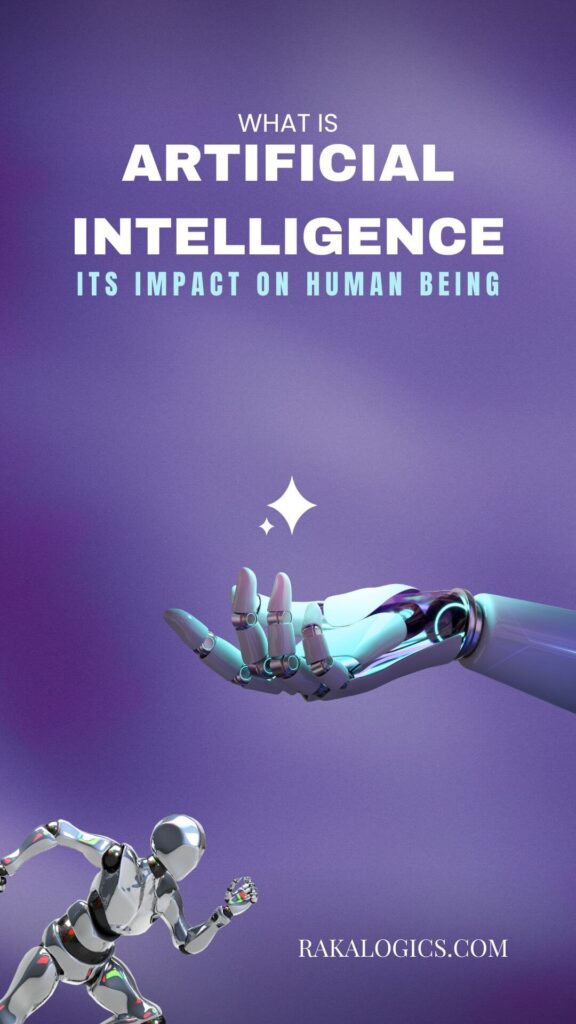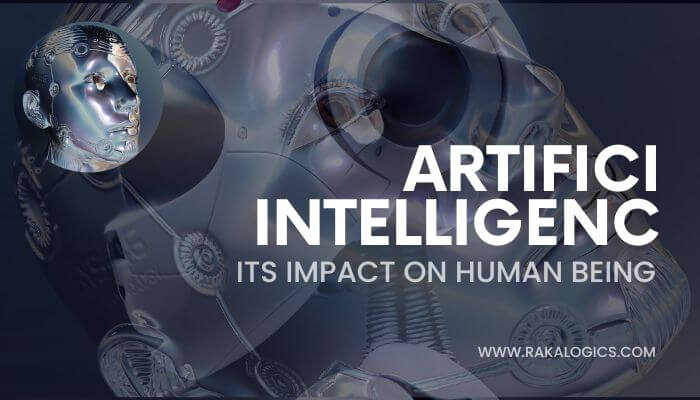What is artificial intelligence and its impact on human being. Artificial intelligence (AI) is a field of computer science and engineering that aims to create intelligent machines that can think and act like humans. AI systems can be trained to perform a wide range of tasks, including recognizing patterns, making decisions, and solving problems.
Impact of AI on human Beings in 2024
In 2024, it is likely that AI will continue to have a significant impact on various aspects of human life, including work, healthcare, education, and entertainment. Some of the potential ways that AI could impact humans in 2024 include:
- Automation of jobs: AI could potentially automate many tasks that are currently performed by humans, leading to job displacement in some industries. However, AI could also create new job opportunities in fields such as data science and AI development.
- Improved healthcare: AI could be used to analyze medical data and assist in the diagnosis and treatment of diseases. It could also be used to monitor patient health and alert healthcare providers to potential issues.
- Enhanced education: AI could be used to personalize learning experiences for students and provide additional support to teachers. It could also be used to create virtual learning environments and improve access to education in remote areas.
- Improved entertainment: AI could be used to create more realistic and immersive experiences in games, movies, and other forms of entertainment. It could also be used to create personalized recommendations for media consumption.

What is artificial intelligence and its impact on human being
Overall, the impact of AI on humans in 2024 will depend on how it is implemented and used. While it has the potential to bring significant benefits, it is important to consider the potential consequences of AI, including the potential for job displacement and the need to ensure that AI systems are transparent, fair, and accountable.
Read More: 15 Online Business Ideas 2024
Let’s discuss this with some examples to illustrate each of the points I mentioned earlier:
Automation of jobs:
For example, AI could be used to automate tasks such as data entry, customer service, and even driving. This could lead to job displacement in certain industries, but it could also lead to the creation of new job opportunities in fields such as AI development and data science.
Improved healthcare:
AI could be used to analyze medical data and assist in the diagnosis and treatment of diseases. It could also be used to monitor patient health and alert healthcare providers to potential issues. For example, an AI system could analyze a patient’s vital signs and alert a doctor if it detects an irregularity.
Enhanced education:
AI could be used to personalize learning experiences for students by adapting to their individual learning styles and needs. It could also be used to provide additional support to teachers, such as by grading assignments or providing feedback to students. Additionally, AI could be used to create virtual learning environments and improve access to education in remote areas.
Read More: Get Google Adsense Approval in 2024
Improved entertainment:
AI could be used to create more realistic and immersive experiences in games and movies. It could also be used to create personalized recommendations for media consumption, such as suggesting movies or TV shows based on a user’s past viewing history.
I hope these examples help to illustrate how AI could impact various aspects of human life in 2024. It is important to note that these are just a few potential examples and that the actual impact of AI will depend on how it is implemented and used.
Positive and negative effects of artificial intelligence on everyday life
Artificial intelligence (AI) has the potential to bring both positive and negative effects on everyday life.
Some potential positive effects of AI include:
- Improved efficiency: AI can automate tasks and processes, which can lead to increased efficiency and productivity. For example, AI could be used to analyze and process large amounts of data, freeing up time for human workers to focus on more complex tasks.
- Improved decision-making: AI can analyze data and make decisions based on that analysis, potentially leading to more informed and accurate decisions. For example, an AI system could be used to analyze financial data and make investment recommendations.
- Enhanced personalization: AI can be used to create personalized experiences, such as personalized recommendations for products or media. This can make it easier for people to find the things that they are interested in and save time in the process.
- Improved healthcare: AI can be used to analyze medical data and assist in the diagnosis and treatment of diseases. It can also be used to monitor patient health and alert healthcare providers to potential issues.
Some potential negative effects of AI include:
Lets discuss some negative effects of AI to give more understanding more about What is artificial intelligence and its impact on human being.
- Job displacement: AI has the potential to automate tasks and processes, which could lead to job displacement in certain industries.
- Ethical concerns: AI systems can be biased if they are trained on biased data, and this can lead to unfair outcomes. It is important to ensure that AI systems are transparent, fair, and accountable.
- Security concerns: AI systems can be vulnerable to hacking and other types of cyber attacks, which could lead to security breaches and other negative consequences.
- Privacy concerns: AI systems can generate and collect large amounts of data, which could raise privacy concerns if that data is not properly protected.
What is artificial intelligence and its impact on human being
Overall, the impact of AI on everyday life will depend on how it is implemented and used. It is important to carefully consider the potential consequences of AI and to ensure that it is used in a responsible and ethical manner.
Impact of Artificial intelligence (AI) on Society
Artificial intelligence (AI) has the potential to impact society in a number of ways. Some potential impacts of AI on society include:
- Job displacement: AI has the potential to automate tasks and processes, which could lead to job displacement in certain industries. This could have significant economic and social consequences, including income inequality and social unrest.
- Changes in the way we work: AI could change the way that work is organized and performed, potentially leading to new job opportunities in fields such as AI development and data science. It could also lead to the emergence of new business models and ways of working, such as remote work and gig work.
- Improved healthcare: AI could be used to analyze medical data and assist in the diagnosis and treatment of diseases, potentially leading to improved healthcare outcomes.
- Enhanced education: AI could be used to personalize learning experiences for students and provide additional support to teachers. It could also be used to create virtual learning environments and improve access to education in remote areas.
- Improved entertainment: AI could be used to create more realistic and immersive experiences in games, movies, and other forms of entertainment.
Job displacement
AI has the potential to automate tasks and processes that are currently performed by humans, which could lead to job displacement in certain industries. This could have significant economic and social consequences, such as income inequality and social unrest. It is important to consider the potential impact of AI on employment and to ensure that there are adequate measures in place to support those who may be affected by job displacement.
Changes in the way we work
AI could change the way that work is organized and performed, potentially leading to new job opportunities in fields such as AI development and data science. It could also lead to the emergence of new business models and ways of working, such as remote work and gig work. For example, AI could be used to automate tasks such as data entry and customer service, potentially leading to the creation of new job opportunities in fields such as AI development and data science.
Improved healthcare
AI could be used to analyze medical data and assist in the diagnosis and treatment of diseases, potentially leading to improved healthcare outcomes. For example, an AI system could analyze medical records and identify patterns that could indicate a particular disease or condition. It could also be used to monitor patient health and alert healthcare providers to potential issues.
Enhanced education
AI could be used to personalize learning experiences for students by adapting to their individual learning styles and needs. It could also be used to provide additional support to teachers, such as by grading assignments or providing feedback to students. Additionally, AI could be used to create virtual learning environments and improve access to education in remote areas.
Improved entertainment
AI could be used to create more realistic and immersive experiences in games, movies, and other forms of entertainment. It could also be used to create personalized recommendations for media consumption, such as suggesting movies or TV shows based on a user’s past viewing history.
Overall, the impact of AI on society will depend on how it is implemented and used. It is important to carefully consider the potential consequences of AI and to ensure that it is used in a responsible and ethical manner.
Conclusion
In the Topic “What is artificial intelligence and its impact on human being” Artificial intelligence is a powerful technology that has the potential to revolutionize many industries and transform how we live and work. By using computer systems to perform tasks that typically require human intelligence, AI can help us to solve complex problems and make decisions more efficiently. However, it is important to consider the ethical implications of AI and to ensure that it is used in a responsible and sustainable manner. As we continue to develop and advance AI, it will be important to carefully consider the impact on humanity and to ensure that the benefits of this technology are shared by all.




